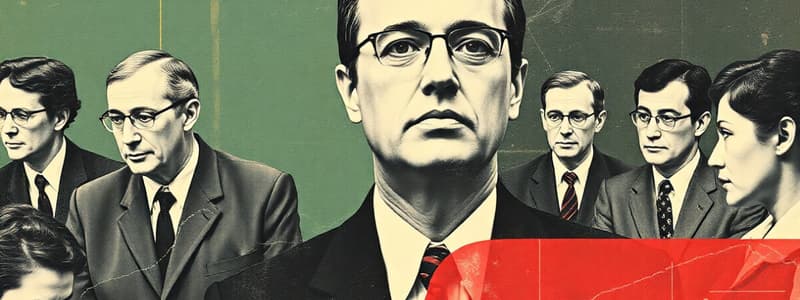Podcast
Questions and Answers
How does low personal responsibility for decisions impact our willingness to harm others?
How does low personal responsibility for decisions impact our willingness to harm others?
- It diminishes our accountability and allows for more harmful decisions. (correct)
- It increases our accountability and reduces harm.
- It encourages us to intervene in harmful practices.
- It has no effect on decision-making.
How does reinforcement theory relate to organizational behavior?
How does reinforcement theory relate to organizational behavior?
- It suggests that behavior is influenced by the consequences that follow it, like rewards or discipline. (correct)
- It focuses on the role of intrinsic motivation in shaping employee behavior.
- It emphasizes how personal values and beliefs affect behavior.
- It suggests that negative reinforcement is more effective than positive reinforcement in modifying employee behavior.
What can be a psychological effect on managers under high pressure to meet targets?
What can be a psychological effect on managers under high pressure to meet targets?
- They may adopt unethical mindsets to achieve outcomes. (correct)
- They typically experience a decrease in decision-making capacity, leading to less involvement.
- They might show bias in hiring practices based on personal preferences.
- They are more likely to offer training and development programs.
What characterizes 'Good Soldiers' in terms of their approach to organizational policies?
What characterizes 'Good Soldiers' in terms of their approach to organizational policies?
What was the primary focus of the Milgram Experiment?
What was the primary focus of the Milgram Experiment?
Which of the following best describes individuals classified as 'Grenades'?
Which of the following best describes individuals classified as 'Grenades'?
What aspect of the Milgram Experiment emphasizes the issue of psychological distance?
What aspect of the Milgram Experiment emphasizes the issue of psychological distance?
What distinguishes 'Cannons' from other types of employees in an organization?
What distinguishes 'Cannons' from other types of employees in an organization?
Flashcards are hidden until you start studying
Study Notes
Employee Types
- Good Soldiers: Follow rules, have good morals, question orders
- Loose Cannons: May know rules but don't care, operate on their own agenda
- Grenades: Possess good morals but lack company knowledge and standards
Milgram Experiment
- A study measuring obedience to authority
- Participants were told to administer electric shocks to "learners" (actors)
- Participants continued to administer shocks regardless of learner's pain
- Highlighted the tendency to obey authority, even when it conflicts with morals
Psychological Distance
- Creates a disconnect between actions and their consequences
- Individuals are less accountable for distant or unseen harm
- Less likely to intervene in decisions made by others, blaming them for the outcome
Rewards and Discipline
- Reinforcement theory states people repeat rewarded behaviors and avoid punished ones
- Rewards can incentivize unethical behavior:
- Sales associates may engage in questionable practices to achieve sales goals
- Managers may be tempted to take unethical shortcuts to meet targets
- Discipline:
- Should be fair, consistent with similar offense, and allow employees to explain their actions
- Acts as a deterrent, reinforcing ethical expectations
Diffusing Responsibility in Groups
- Group decisions can diffuse responsibility, leading to a lack of accountability
- Managers should:
- Solicit anonymous feedback
- Appoint a "devil's advocate" to challenge decisions
- Seek external perspectives
Divided Responsibility
- Specialization in large organizations can result in employees focusing only on their tasks
- Lack of awareness of the bigger picture can lead to missed opportunities to prevent negative outcomes
People Fill Their Roles
- Roles can influence behavior, causing individuals to de-emphasize their personal morals
- Managers should consider potential conflicts between organizational and professional responsibilities
- Anticipate and address potential ethical issues arising from role-playing
Studying That Suits You
Use AI to generate personalized quizzes and flashcards to suit your learning preferences.




